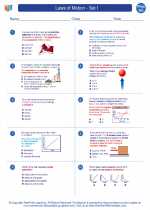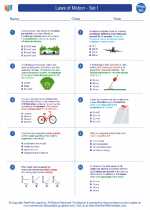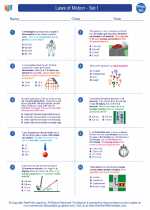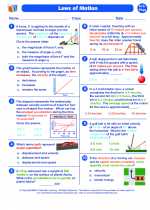Spin in Physics
Spin is a fundamental property of particles in quantum mechanics. It is a form of intrinsic angular momentum that is associated with elementary particles, such as electrons, protons, and neutrons. Spin is a quantum mechanical phenomenon and does not have a classical analog. It is a fundamental aspect of particle physics and plays a crucial role in our understanding of the behavior of subatomic particles.
Key Concepts
- Quantum Mechanical Property: Spin is a quantum mechanical property of particles and is not related to their actual physical rotation.
- Quantization: Spin is quantized, meaning it can only take on certain discrete values, such as 1/2, -1/2, 1, -1, etc.
- Spin States: Particles can exist in different spin states, typically denoted as "up" and "down" for spin-1/2 particles.
- Pauli Exclusion Principle: The Pauli Exclusion Principle states that no two identical fermions (particles with half-integer spin) can occupy the same quantum state simultaneously.
- Spin Operators: In quantum mechanics, spin is described using mathematical operators that represent the observable quantities associated with spin, such as spin angular momentum and spin projection.
Implications and Applications
Understanding the concept of spin has significant implications in various areas of physics, including:
- Quantum Mechanics: Spin is crucial for understanding the behavior of particles at the quantum level, and it is incorporated into the mathematical formalism of quantum mechanics.
- Atomic Structure: Spin plays a role in the structure of atoms and the behavior of electrons within atomic orbitals.
- Particle Physics: Spin is a fundamental property used to classify and describe elementary particles, and it influences their interactions and behavior in particle physics experiments.
Study Guide
To deepen your understanding of spin in physics, consider the following study guide:
- Review the basics of angular momentum in classical mechanics and understand the differences between classical and quantum mechanical angular momentum.
- Learn about the Stern-Gerlach experiment, which provided experimental evidence for the quantization of spin.
- Study the mathematical formalism of spin in quantum mechanics, including the use of spin operators and the representation of spin states using ket notation.
- Explore the applications of spin in various areas of physics, such as atomic physics, particle physics, and quantum information processing.
- Practice solving problems that involve spin, such as determining the possible spin states of particles and calculating spin-related observables.
By mastering the concept of spin, you will gain a deeper insight into the behavior of subatomic particles and their fundamental properties in the quantum realm.
.◂Physics Worksheets and Study Guides High School. Laws of Motion - Set I

 Worksheet/Answer key
Worksheet/Answer key
 Worksheet/Answer key
Worksheet/Answer key
 Worksheet/Answer key
Worksheet/Answer key
